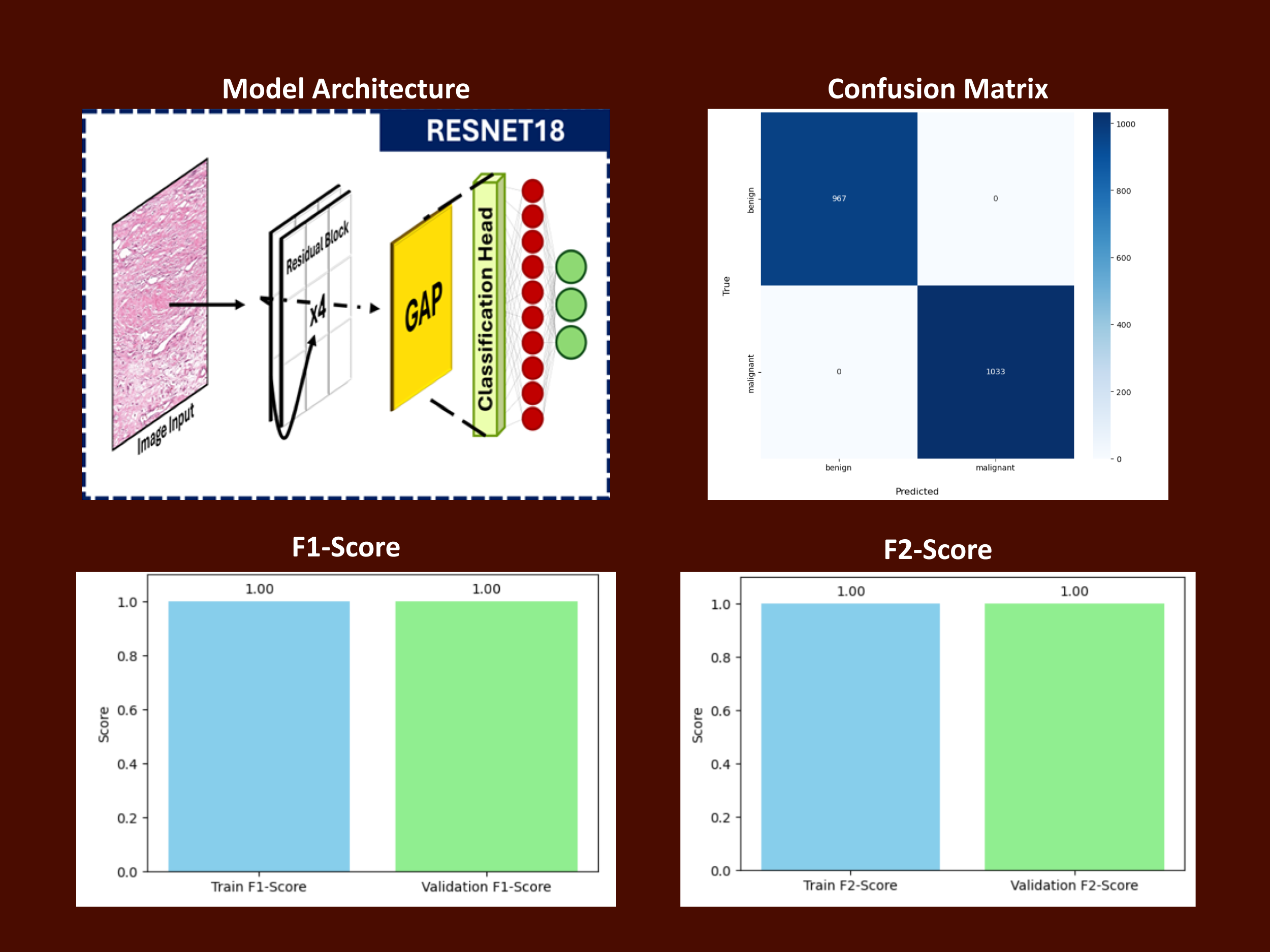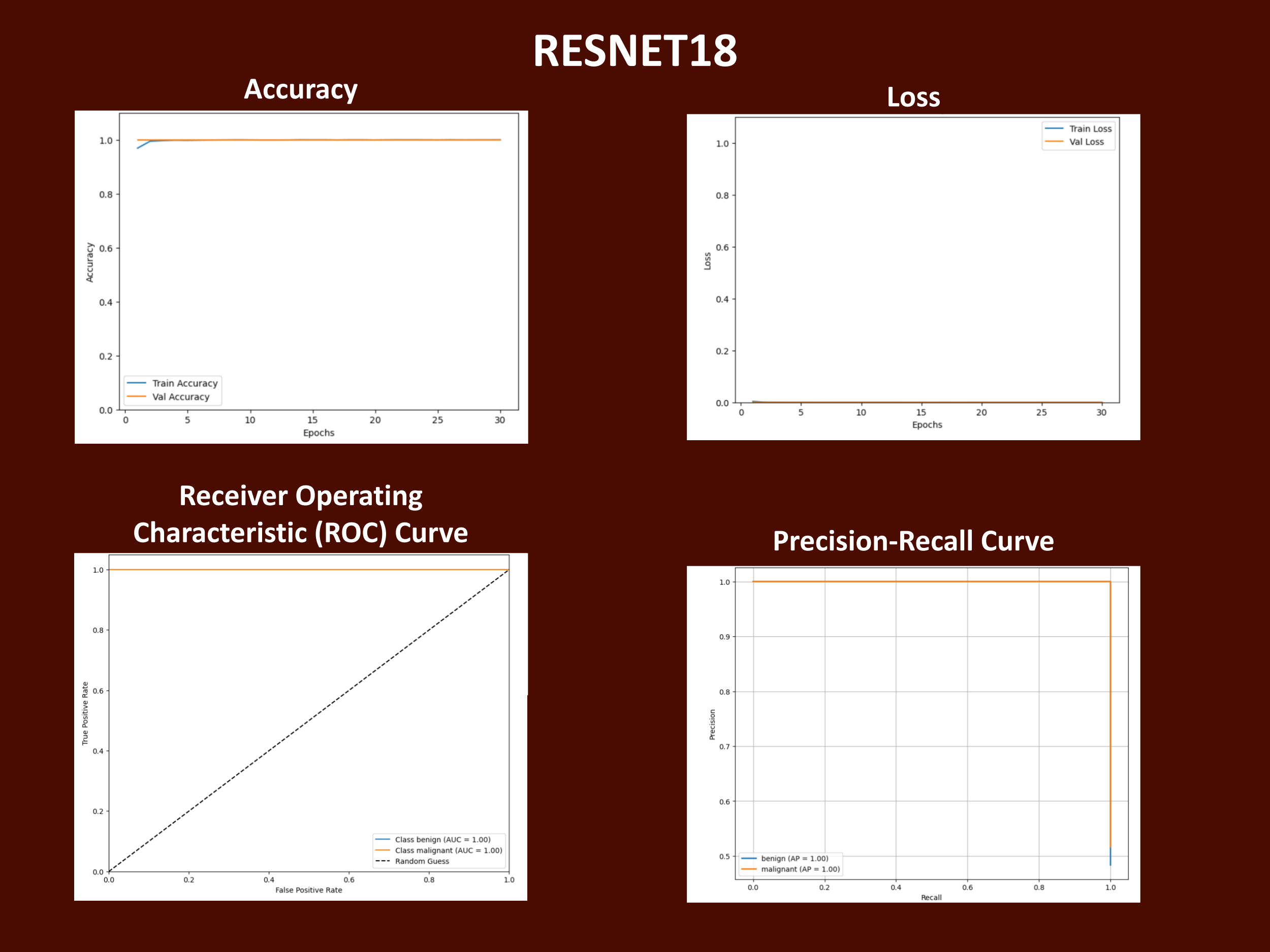Sunday Poster Session
Category: Colon
P0293 - A Versatile ResNet18-Based AI Application for High-Precision Colorectal Cancer Detection
Sunday, October 26, 2025
3:30 PM - 7:00 PM PDT
Location: Exhibit Hall
- AS
Alison Seales, BS
St. George's University School of Medicine
Phoenix, AZ
Presenting Author(s)
Alison Seales, BS1, Ramya Elangovan, 2, Jansi Sethuraj, BSN, RN, CCRN3, Kavin Elangovan, 2, Tirth Patel, MBBS4, Elangovan Krishnan, MBBS, PhD, MS5
1St. George's University School of Medicine, Phoenix, AZ; 2AIM DOCTOR, Houston, TX; 3University of Texas Health Science Center, Houston, TX; 4GMERS Medical College and Hospital, Himmatnagar, Himmatnagar, Gujarat, India; 5AIM DOCTOR, Chennai, Tamil Nadu, India
Introduction: Colorectal cancer is the third most commonly diagnosed malignancy and the second leading cause of cancer-related mortality worldwide, with over 150,000 new cases and 50,000 deaths annually in the United States alone. Despite advances in screening, diagnostic challenges persist, particularly in early-stage or atypical presentations. Histopathological examination is the gold standard, yet subjectivity and interobserver variability can hinder timely, accurate diagnosis. Deep learning models, particularly ResNet18, a residual neural network architecture leveraging skip connections for efficient and robust feature extraction, offer transformative potential in automating and standardizing colon cancer diagnostics.
Methods: Anonymized histopathological images of colon tissue (n = 10,000), encompassing both malignant and benign cases, were divided into training (60%), validation (20%), and testing (20%) cohorts. Images underwent comprehensive preprocessing and augmentation to enhance model generalizability. The ResNet18 architecture was trained and optimized, and its diagnostic performance was evaluated using accuracy, precision, recall, F1-score, F2-score, and the area under the receiver operating characteristic curve (AUROC) on both validation and test sets. The final model was deployed as a universally accessible, multiplatform application for real-time expert validation and diagnostic support.
Results: ResNet18 demonstrated robust performance in distinguishing malignant from benign colon tissue. The model achieved exceptional overall accuracy, precision, and recall (all exceeding 99%) in detecting both cancerous and normal tissues. The F1-score was 1.00 for both categories. The peak AUROC reached 1.000, underscoring the model’s remarkable discriminative power. These results highlight ResNet18’s capacity to deliver high-fidelity, reproducible diagnostics in histopathology.
Discussion: ResNet18’s strong performance illustrates the transformative role of deep learning in colon cancer diagnostics. By automating feature extraction and classification, AI reduces diagnostic subjectivity and accelerates clinical workflows. Universal deployment democratizes access to advanced diagnostics, supporting clinicians in diverse settings and potentially improving patient outcomes through earlier, more accurate detection of colorectal malignancies.

Figure: Diagnostic Performance of ResNet18 in Colon Cancer Detection

Figure: Model Architecture and Model Performance of ResNet18 in Colon Cancer Detection
Disclosures:
Alison Seales indicated no relevant financial relationships.
Ramya Elangovan indicated no relevant financial relationships.
Jansi Sethuraj indicated no relevant financial relationships.
Kavin Elangovan indicated no relevant financial relationships.
Tirth Patel indicated no relevant financial relationships.
Elangovan Krishnan indicated no relevant financial relationships.
Alison Seales, BS1, Ramya Elangovan, 2, Jansi Sethuraj, BSN, RN, CCRN3, Kavin Elangovan, 2, Tirth Patel, MBBS4, Elangovan Krishnan, MBBS, PhD, MS5. P0293 - A Versatile ResNet18-Based AI Application for High-Precision Colorectal Cancer Detection, ACG 2025 Annual Scientific Meeting Abstracts. Phoenix, AZ: American College of Gastroenterology.
1St. George's University School of Medicine, Phoenix, AZ; 2AIM DOCTOR, Houston, TX; 3University of Texas Health Science Center, Houston, TX; 4GMERS Medical College and Hospital, Himmatnagar, Himmatnagar, Gujarat, India; 5AIM DOCTOR, Chennai, Tamil Nadu, India
Introduction: Colorectal cancer is the third most commonly diagnosed malignancy and the second leading cause of cancer-related mortality worldwide, with over 150,000 new cases and 50,000 deaths annually in the United States alone. Despite advances in screening, diagnostic challenges persist, particularly in early-stage or atypical presentations. Histopathological examination is the gold standard, yet subjectivity and interobserver variability can hinder timely, accurate diagnosis. Deep learning models, particularly ResNet18, a residual neural network architecture leveraging skip connections for efficient and robust feature extraction, offer transformative potential in automating and standardizing colon cancer diagnostics.
Methods: Anonymized histopathological images of colon tissue (n = 10,000), encompassing both malignant and benign cases, were divided into training (60%), validation (20%), and testing (20%) cohorts. Images underwent comprehensive preprocessing and augmentation to enhance model generalizability. The ResNet18 architecture was trained and optimized, and its diagnostic performance was evaluated using accuracy, precision, recall, F1-score, F2-score, and the area under the receiver operating characteristic curve (AUROC) on both validation and test sets. The final model was deployed as a universally accessible, multiplatform application for real-time expert validation and diagnostic support.
Results: ResNet18 demonstrated robust performance in distinguishing malignant from benign colon tissue. The model achieved exceptional overall accuracy, precision, and recall (all exceeding 99%) in detecting both cancerous and normal tissues. The F1-score was 1.00 for both categories. The peak AUROC reached 1.000, underscoring the model’s remarkable discriminative power. These results highlight ResNet18’s capacity to deliver high-fidelity, reproducible diagnostics in histopathology.
Discussion: ResNet18’s strong performance illustrates the transformative role of deep learning in colon cancer diagnostics. By automating feature extraction and classification, AI reduces diagnostic subjectivity and accelerates clinical workflows. Universal deployment democratizes access to advanced diagnostics, supporting clinicians in diverse settings and potentially improving patient outcomes through earlier, more accurate detection of colorectal malignancies.

Figure: Diagnostic Performance of ResNet18 in Colon Cancer Detection

Figure: Model Architecture and Model Performance of ResNet18 in Colon Cancer Detection
Disclosures:
Alison Seales indicated no relevant financial relationships.
Ramya Elangovan indicated no relevant financial relationships.
Jansi Sethuraj indicated no relevant financial relationships.
Kavin Elangovan indicated no relevant financial relationships.
Tirth Patel indicated no relevant financial relationships.
Elangovan Krishnan indicated no relevant financial relationships.
Alison Seales, BS1, Ramya Elangovan, 2, Jansi Sethuraj, BSN, RN, CCRN3, Kavin Elangovan, 2, Tirth Patel, MBBS4, Elangovan Krishnan, MBBS, PhD, MS5. P0293 - A Versatile ResNet18-Based AI Application for High-Precision Colorectal Cancer Detection, ACG 2025 Annual Scientific Meeting Abstracts. Phoenix, AZ: American College of Gastroenterology.
